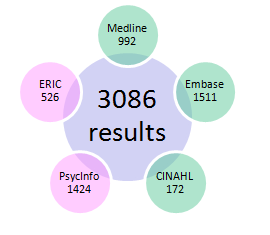


Theme
10II Simulator
INSTITUTION
University Health Network - Toronto, Ontario
University of Toronto - Toronto, Ontario

Understanding how much mental effort, or cognitive load, that trainees experience might help us to design better simulation-based training. We conducted a systematic literature review to better understand how cognitive load has been measured across simulation contexts.
We developed a systematic review protocol in accordance with PRISMA quality standards. A total of 3086 unique records were retrieved from 5 databases: MEDLINE, EMBASE, PsycInfo, CINAHL, and ERIC. Search terms represented both the phenomenon of interest (e.g., cognitive/mental: load, workload, effort, demand) and the context (e.g., patient simulation, space simulation, computer simulation, computer assisted instruction). A multi-stage process was used to select simulation-based studies that measured cognitive load with respect to learning processes and/or outcomes. A total of 59 articles met our selection criteria. Data extracted via a coding sheet included: study aim, method, measures, findings, study quality, and implications.
 |
Cognitive load has been measured in diverse populations including medical and health professionals, military pilots, and university students. Measurement techniques include literature-based rating scales, physiological measures (e.g., heart rate, pupil dilation), and secondary task performance. Further analyses will examine the relative frequency of the different types of measures along two primary dimensions: self-report versus observed and retrospective versus concurrent. Preliminary analyses suggest that retrospective, self-report measures are the most frequently used across simulation contexts. |
The measurement of cognitive load has been reliant on retrospective, self-report data. Triangulation with concurrent and observed measures is required to more fully understand how cognitive load influences learning processes. Further research to investigate physiological and secondary task cognitive load measures in simulation-based procedural skills training is thus warranted.
Sensitive and reliable cognitive load measures are necessary to inform instructional design decisions for simulation-based procedural skills training.
Thank you to Ani Orchanian-Cheff, Information Specialist at UHN, for helping us construct and execute the database search.
 Send Email
Send Email